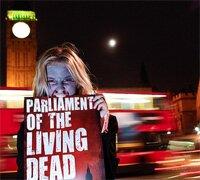Who Should Decide What Schools The State Provides?
Education policies have raised some good questions lately, and not only about pedagogy (whatever that means). They’ve brought into focus tricky issues – well, I find them tricky – about freedom and equality, choice and social cohesion, “localism” and centralised control.
Consider these recent developments. The Guardian has reported that ministers are conducting an “urgent review” into the academies programme launched under Tony Blair. This will have given some satisfaction to critics who have long claimed that these expensive secondaries, which are state-funded but operate largely independently of local authorities, are failing to fulfil their principal remit of improving attainment among poor children in urban areas.
Stoke-On-Trent Labour Councillor Peter Kent-Baguley is among these critics. He is not alone in seeing academies as, in his words, “creating structural inequality” in education. Their opponents believe that such success as these schools claim – and some can claim very little – can be largely attributed to their enthusiasm for excluding troublesome pupils, who then have to be taken in by neighbouring LEA schools.
Falling pupil numbers mean that Stoke is to reorganise its secondary provision, with some existing schools likely to be closed. Kent-Baguley accepts the need for change, but is enraged by what he sees as central government’s interference in the form of education consultants SERCO being “catapulted” in to manage it. He regards SERCO as the instrument by which the government will impose academies on his city, whether it wants them or not. He fears social division in education imposed from above.
Now let’s look at what David Cameron has been saying. The Tories, of course, have pledged to accelerate the academy programme. But last week their leader made a speech (cheekily, in Manchester) promising to enable parent or community groups to set up their own schools – as “Conservative co-operatives” – using the money their LEA would otherwise be spending on their children at existing ones. Until more details are published it’s hard to judge this policy, but it certainly looks like a further potential challenge to the power of local government. In this case, though, the challenge, though enabled from the centre, could come from below.
Might there be merit in Cameron’s idea? There are obvious reasons for concern. Chris Keates of the NASAWT said such co-op schools would be “a recipe for social segregation.” Would they simply give hardline religious groups, ethnic separatists, the pushy posh and others the freedom to effectively insulate their kids against others “not like us” at those other kids’ and tax-payers’ expense?
But there’s another way of looking at it. Cameron characterised his idea as “giving ownership” of education to parents, a formula to please his core voters. Yet might such a reform turn out to be truly “localist”, reinvigorating active citizenship on the ground and having the potential to support those children, which existing schools and policies are finding hard to help by placing them in environments more suited to their educational needs? And, if so, should the Left consider adopting – or at least adapting – the principle, even if not the precise Tory policy when it emerges?
I find it hard to say. On the one hand I sympathise with Peter Kent-Baguely and I’m receptive to the idea of power being devolved further than even many local councillors might like. On the other, I’m aware that the freedoms this would bestow could end up being enjoyed by the few at the expense of the rest and narrow children’s horizons in the process. Is there a way of having the best of both worlds? And if so, can someone tell me what it is?
-------------------------
| Tweet |
Dave Hill is a regular contributor to Liberal Conspiracy. He is a novelist, blogger, journalist, married resident of Hackney in east London and father of six children. His novels are about family life. Most of his journalism is for the Guardian and may be about anything from politics to sport to domestic appliances. His Big Britain blog carries a mixture of commentary, photographs and links to local blogs all over the UK. His own local blog called Clapton Pond documents the life and times of the enthralling, sometimes appalling, often inspiring piece of Britain where he lives. London Mayor & More is tracking the mayorality campaign. Also at: Comment is free, Big Britain, London Mayor & More and Clapton Pond
· Other posts by Dave Hill
Filed under
Blog ,Education
15 responses in total ||
Is there a way of having the best of both worlds? And if so, can someone tell me what it is?
Probably not. Apart from anything else, if you devolve power, it is inevitable that some will use it better than others. But having worked in education for over ten years now, there’s no doubt in my mind that dismantling both Scotland and England’s ridiculously over-centralised education systems is (part of) the answer.
But I’m sceptical about what seems to be the general consensus these days, which is the solution to our education woes lies in introducing new structures all the time. They’ve been doing it since Thatcher and it hasn’t worked. Better if central government simply backed off a bit.
Here’s my suggestions:
1) Scrap the National Curriculum.
2) Do something with Her Majesty’s Inspectorate. Dunno what, exactly – maybe some radical remedial education for them.
3) A national discipline strategy based on press-ups.
Sounds OK to me, Shuggy, but I’m not doing any damned press-ups.
Dave
For me the key area in this debate is admissions. Trapped by the rhetoric of parental choice, locked in by a tabloid league table agenda of what constitutes a `good’ school and unwilling to confront the evidence about selective admissions policies, ministers are still allowing admissions policy to drift in a direction that works against every other strand of government policy.
Current secondary school admissions policies institutionalise inequality. They intensify social, cultural and ethnic divisions and foster delusions about consumer choice and reinforce outdated perceptions of quality in education. Our divisive secondary school system is working against our objective of increasing post-16 staying on rates and widening participation in universities.The Code of Practice on School Admissions already excludes selection by ability as an admission criteria to all primary schools. This should be extended to include secondary schools. A policy focused on parental choice would throw open hundreds of thousands of places in good schools to parents who have previously been excluded from applying. The winners would far outnumber those who would be anxious about loss of privilege.
Academies – The common argument against Academies is that once established they might well end up sucking resources from other local comprehensive schools. But will they? As long as academies remain in the depressed hearts of the old towns and cities and, perhaps most importantly of all, maintain their all-ability intake, I do not think that the Liberal left should worry too much. The real challenge is how to make education in the inner city both transformational and inspirational. It is just possible that academies may provide a means of local communities meeting these challenges.
What many people overlook is that in the setting up of so many of these new Academies in areas of significant social and economic deprivation, the government has rediscovered what many used to call “compensating measures”. The recent IPPR report provides some helpful ideas as to a possible way forward:
1. No state school should administer its own admissions process – there should be an independent admission administrator in every local authority. Unless the new Admissions Code results in significant reductions in segregation, schools should cease to be their own admission authorities and local authorities should take over this role instead.
2. Fair banding by ability should be used as an oversubscription criterion for all schools, and in the longer term should apply not just to the applicants to each school but across wider local areas too.
3. Faith schools should be included in such banding arrangements, but could give priority to applicants on the basis of faith within each ability band.
4. Local Admission Forums should be required to produce a regular report on levels of segregation by income and ability in their local schools. The recent Education and Inspections Act gave local authorities the ‘power’ to produce this report but they are not obliged to do so.
This is my brief reflection – happy to provide a more detailed response!
“Who decides what schools the State provides?”
That depends on your definition of “provides”. If it just means “funds” then that is tricky, fro the State does not fund anything, but taxpayers do! If it means “administers”, then surely the State should decide. The question itself is a bit of a framing exercise and not entirely helpful, btw.
The problem is that the State runs a near monopoly and that is a problem – there is no natural monopoly in education, however. Independent schools should exist and compete alongside the State for the per-pupil funding. If the Independents do well and are popular, the State schools can learn from them (if dogma does not get in the LEA’s way). If the State is doing a cracking good job, then good thing too. The kind of schools the State should provide would be influenced by this. If the educationalists provide schools parents hate, they will end up empty. If they provide schools the parents love, the Independents will hardly get a look-in.
I agree that selection by ability should be scrapped as it does entrench segregation. But it is not enough just to give people more equitable access to a limited number of good schools. Otherwise it will go from being a postcode and ability lottery to being just a pure lottery. So, in addition to scrapping selection by ability, you need to expand the supply of good schools by allowing new independent schools to open, just has been done very successfully in Sweden. That way, you get schools trying to get more parents to send their children there – rather than parents fighting to get their children into the few good schools:
http://www.civitas.org.uk/education/choice.php
I with Mike Ion on much of this. Surely the only way to ensure a good education for all is through the state? Admissions are a disgrace at the moment, and should be administered by the LEA.
LEA’s are much misunderstood, but should remain at the heart of the education process at local level.
I don’t buy Mike’s argument about academies though. If LEAs are to be at the heart of education, where do Academies fit in?
Is there any evidence that in areas where there are no grammar schools the education provided is better than in areas where there are?
My guess is that there isn’t. If this is the case, then aren’t arguments about admissions policies missing the point – that schools are, in general, not fit for purpose?
promising to enable parent or community groups to set up their own schools – as “Conservative co-operatives” – using the money their LEA would otherwise be spending on their children at existing ones.
Would this actually happen in reality? How does a group of parents – which would have to number several dozen at the very least, maybe even hundreds – get together to efficently set-up a school? My guess is that they won’t… but large, private, service delivery companies similar to Fremantle, populated at board level by a cabal of ex-Public-School headmasters, will do so instead. “Oh no, we’re not Public Schools… we’re Conservative Co-operatives“.
I have to say that I think most policies, even when they mean well, fly in the face of awkward reality. ‘Troublesome’ pupils are everywhere, and if you’ve seen teachers, cover supervisors or teaching assistants trying to deal with the classroom wreckage they create you’ll have a little more sympathy for blunt measures, a little less for inclusiveness. ‘Troublesome’ pupils usually have problems that classrooms can’t solve, and the disruption they are allowed to cause in the name of an executive head maintaining his or her reputation has to be seen to be believed.
Like you, Dave, I have some sympathy for Peter Kent-Baguley because SERCO has left plenty of wreckage in its own wake. But it has been given the freedom to do so by the dogmatic attitude of the wonks who continue to buzz round the Dfes like flies on a corpse.
As for academies, don’t tar them all with the same brush. They often have challenging intakes, and those I’ve come across are often making entirely sensible steps to achieve long-term improvement.
And if anyone knows the individuals who originally came up with the league tables idea…Jeez, I’d love to be a troublesome pupil in his classroom.
Current secondary school admissions policies institutionalise inequality. They intensify social, cultural and ethnic divisions and foster delusions about consumer choice and reinforce outdated perceptions of quality in education. Our divisive secondary school system is working against our objective of increasing post-16 staying on rates and widening participation in universities.
Mike, you might be right, but in my opinion you’re only right about irrelevancies.
‘Secondary school admissions institutionalise inequality’. How do they do that? If it’s by academic selection, then it’s by recognising inequality that is already there! The focus on secondary selection is a complete red herring; to pretend that banning secondary selection would somehow eliminate or ameliorate the inequalities already in existence by that point is foolishness, and dangerous foolishness because it carries the appearance of ‘doing something’ without really making much of a difference to the real problems.
If kids are already clearly unequal by the time that they reach secondary school, then the failure has already happened, and no amount of pretending that all kids aged eleven are equal will make it otherwise.
Rob, I agree that there are certain inequalities which arise due to social factors – it’s been established beyond doubt that there is a link between differences in children’s lives during their first few years and their ultimate educational achievements. Basically, middle class kids in general do better than those from poorer families.
It is also true though that different children will always have different abilites so there will always be inequalities in that sense. ISTM that it is important that we have social policies which try to mitigate the first point and education policies which recognise the latter and try to ensure that every child, whatever their abilities, has an equal right to fulfill their potential.
The basic objection to academies in this area can be characterised as:
1) We’re told they are performing better than the local comprehensive, but this isn’t surprising since they have roughly 2x the funding and despite the rules, use a lot of informal mechanisms to make sure they only select higher ability students.
So, part of the problem is simply that some of these academies are corrupting the evidence base of “what works in education.”
2) In one area, there is a virtual monopoly exercised by an academy set up by a deeply religious millionaire. Trouble is, he doesn’t believe in evolution and he certainly doesn’t believe in your right to be anything other than Christian as a child. That seems like a failure of the system. I certainly can’t see it producing many skilled workers for the bio-nano-technology revolution.
“Is there a way of having the best of both worlds? And if so, can someone tell me what it is?”
Yes, education vouchers. As used in those horrible, right wing, grossly inegalitarian places like, say, Sweden and Holland.
Vouchers aren’t, by any chance, a hobby horse of yours, are they Tim?!?!? I understand the case in favour but Cameron hasn’t bought it (unless his new wheeze is a kind of version of it) and haven’t opponents been vindicated in claiming that they fail to help reduce inequality as yer man Milton F. hoped they would (in Sweden there’s been little change and the Social Democrats would like to get rid of them, I read). Correct me if I’m wrong.
Mike, thanks for that exhaustive comment. You make a strong case for regularised, localised admissions procedures, though the IPPR idea seems to be that faith schools should be partially exempt. I’m not an anti-faith obsessive or against faith schools per se, but if there’s to be one rule for all they’d effectively have to go, wouldn’t they? Academies, I guess, would lose their wriggle room for fiddling.
On academies in general, I’ve got a kid just started at one in Hackney that has a lot pupils from the neighbouring council estate and seems to be doing brilliantly. There appears to be a winning combination of firm structure – “regimentation”, some call it – high expectations, a solicitous attitude to parents, and a high standard of extra-curricular stuff like drama and music to give the children some expressive space. How much this is down to additional funding, how much to the the head and his staff and so on, I can’t say. But it does appear to be working well, and if that continues the school would become a bit of a best practice beacon for all secondaries.
I’m grateful to you all for your input to this thread. I’m not at all clear in my mind what the big answer is, but I do believe that more parental engagement with education in some form would help and also that Rob is right to emphasise the importance of supporting children who are struggling from the earliest possible age.
Plenty of themes to return to…
Quick thoughts
There seems to be an implicit assumption here that the state has a de facto right/duty to educate – I would question this assumption on 2 grounds. The first is a pragmatic observation that the states’ record in education, especially at secondary level, has been mixed to put it politely. The second is more philosophical concern, do we, and I suppose I really mean I, want my children to be immersed in the values of the state during their formative years ?
People start foaming at the mouth at the idea that faith schools “indoctrinate” children, but many (on both left and right and all shades of liberal) take it as read that the state should be the provider of compulsory education. Why is state indoctrination acceptable but other forms (whether religious or otherwise) not ?
Finally, I don’t care if a school is successful in part because it excludes unruly pupils. Anyone who thinks inclusion of the few is more important than the education of the many either doesn’t have children, is lucky enough to have got their kids into a decent state school (they do exist), or educates them outside the state sector. Otherwise, what kind of a parent compromises their child’s future for a social experiment for which the benefits are neither certain nor evidenced by past experience ?
Reactions: Twitter, blogs
Sorry, the comment form is closed at this time.
You can read articles through the front page, via Twitter or RSS feed.
» Why Labour was right to reject Bob’s drug policy
» Ten myths about housing benefit reforms in London
» What if Superdrug lived up to its name?
» Why we want to ‘recall’ Aaron Porter as NUS President
» Breakthrough in drugs debate as MPs call for full decriminalisation
» Report shows how the promise on NHS spending has been broken
» Why climate talks in Cancun failed miserably
» Why cuts to local councils will be much worse than Tories suggest
» Left unity and the bid to oust Aaron Porter
» The true horror of NHS privatisation is slowly coming out
» Why these protests are more dangerous than politicians realise
|
18 Comments 14 Comments 4 Comments 15 Comments 46 Comments 39 Comments 34 Comments 19 Comments 33 Comments 34 Comments |
LATEST COMMENTS » Watchman posted on Why Labour was right to reject Bob's drug policy » amias posted on Were police 'dragged off horses & beaten'? No » G.O. posted on Why Labour was right to reject Bob's drug policy » Hamish posted on What if Superdrug lived up to its name? » Louise Whittle posted on John Pilger shames himself by attacking feminists over Julian Assange » earwicga posted on John Pilger shames himself by attacking feminists over Julian Assange » davehowells posted on More Vodafone and Topshop protests coming » buddyhell posted on Labour voters switch to supporting AV in new poll » Tim Worstall posted on Why Labour was right to reject Bob's drug policy » Chaise Guevara posted on John Pilger shames himself by attacking feminists over Julian Assange » Alex Snowdon posted on John Pilger shames himself by attacking feminists over Julian Assange » the a&e charge nurse posted on John Pilger shames himself by attacking feminists over Julian Assange » earwicga posted on John Pilger shames himself by attacking feminists over Julian Assange » George W. Potter posted on 49 universities are or were under occupation » Richard W posted on John Pilger shames himself by attacking feminists over Julian Assange |















